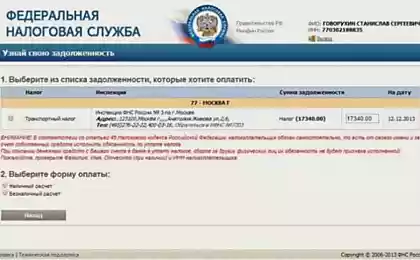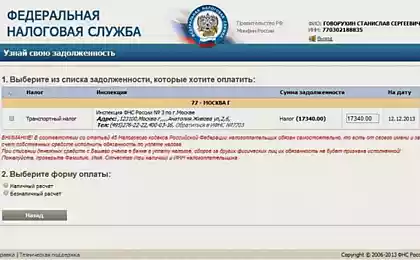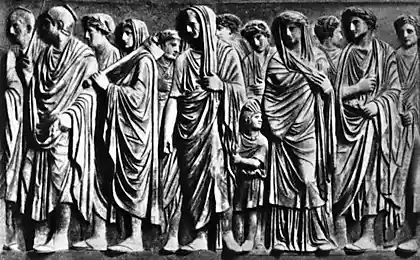817
Absurd taxes (6 photos)
Various governments in all parts of the globe have always shown an enviable ingenuity when it came to tax collection. Most often, different kinds of levies and taxes were just a way to replenish the treasury, but sometimes were motivated and desire to wean people away from bad habits (smoking, for example).
1. Urine

The people lived in ancient Rome - more than a million, and the plumbing has not risen high enough. Sewage flows that regularly produce organisms Roman citizens, threatened to turn the city into a stinking Venice.
The Romans tried to keep their city clean and did not stint on the construction of toilets. And even built a superior, at that time, the sewer system for wastewater. But, the trouble is, not all the toilets in this system failed to connect. Not everyone. Under the majority of the public restrooms were placed containers which, if left unattended, will inevitably have been filled and overflowed.
Fortunately, with the wit of the ancient Romans it was all right. Emperor Vespasian was the first to realize that literally sits on a liquid gold mine. He began to send their people to collect urine, and then deliver it to artisans throughout the city. These artisans were paid a tax on the use of the product life. What however, for them it was easier than themselves produce the whole thing, so they were not offended.
Want to know what it was urine? Tanners used it to soften the skin, and laundress - to give togas famous snow-white glow. Cities are clean, people went ornate, the treasury replenished. Everyone was happy.
When the son of Vespasian rebuked the parent (and rightly, I must say) that this whole story stinks, the emperor, as the story goes, he took the coin from the first profit, raised it to his nose offspring and asked if she stinks. "No," - he replied. "Money does not smell" - summed up by Vespasian.
During his commercial flair Vespasian was awarded by the fact that in many European languages, its name has since firmly connected with the public areas. Judge for yourself: a public toilet is translated into French as the «vespasiennes», Romanian - as the «vespasiene», in Italian - as the «vespasiani» ...
2. Clean

Our ancestors were not very competent in matters of hygiene. What's the truth. However, if you think that the reason for this was the lack of information about the benefits of purity or that they did not like to wash, you are mistaken. In fact, in England and France, for example, unwashed face and matted hair for a long time been the conscience of the governments of these countries, who felt an utter depravity bath and introduced exorbitant tax on the sale of soap.
Over the past 2,000 years bath many times are in vogue and come out of it. Even among the aristocracy was no unanimity on this issue. The Queen Elizabeth I, for example, washed once in three months, and the Spaniard Isabella of Castile, known for its religious fanaticism, in my entire life taking water treatments only twice - on his birthday and before the wedding night. Other "bizarre" the aristocrats did not see anything wrong and tried to bathe as often as once a week.
Only just under Charles I regularly visit the baths once again beginning to gain popularity among the English as King quarreled with parliament and was beheaded. His place was taken by the ultra hates the royal power the Puritan Oliver Cromwell. And the British again overgrown dirt.
God-fearing Puritans believed cleanliness unworthy deed. All that smelled good, and why (oh, horror!) Required to undress - all from the impure. And to people it was easier to recognize the new government introduced a tax on tall soap.
Although the idea of the soap tax belonged to Cromwell, after the restoration of the monarchy a new King Charles II did not find it necessary to change this law. After all, if people were willing to pay for clean, why not take advantage of the situation to the king and did not replenish the treasury?
Tax soap lasted 200 years. He was treated with the seriousness that each manufacturer of soap was put in the royal observer, whose task was to prevent the clandestine manufacture and sale of soap on the black market. When, in 1800, this tax was finally repealed, Chancellor of the Exchequer said the phrase that became winged: "Clean people - happy people." Since then and to this day in England does not stop a hedonistic orgy soap.
3. Beard

Peter the Great went down in history as a great reformer. Done in the 1697-1698 tour of Europe, the Russian Czar conceived grandiose modernization of the country to overcome the backwardness of Russia's western neighbors. The result has been a number of significant achievements, such as the construction of St. Petersburg.
One of the main impediments to the Europeanization Peter thought ... beards.
In Europe, the time has long beards nobody wore. Russian with their long facial hair looked as ridiculous as now looks a man in platform shoes fifteen centimeters floating inside the goldfish. To instill in his people of European culture, Peter issued a decree prohibiting men to wear beards. A character Peter was steep. Sometimes, when he saw the bearded man in the street can grasp and poor forcibly shaved.
But because he was a rational man, then I decided to give the opportunity to keep the beard especially stubborn, if they pay tax. Very high tax. If they so much wanted to embarrass his appearance, then at least for the benefit of the royal treasury.
This annual tax is placed in front of many people is very difficult choice: the fact that according to Russian Orthodox customs man had a beard up to his chest. Ivan the Terrible once even threatened that "shaving the beard makes such a sin, which does not even wash the blood of all the martyrs," which, of course, for every Russian a serious argument.
For most men, the love of money and the fear of Peter outweighed the religious feelings and they shaved. However, the preserved cut beard chastise heirs put them in with him to the grave. This they apparently thought justified before God: like, say, do the right thing, but the circumstances were stronger (and who then had an extra penny to spend it on the facial hair?)
4. Cowardice

The war - not for everyone. During the Vietnam campaign for draft evasion could end up in jail. Nevertheless, many prefer to be in the same cell with criminals than to expose themselves to the bullets.
It was, however, in the history of the time when it was possible to avoid the performance of military duty, legally, simply by paying the tax. This tax is paid knights who did not want to fight.
You see, in those Dark Ages sense of chivalry consisted only to shed blood for their King. For this, many of them received awards, built castles, married the daughters of important men provided themselves with aristocratic habits, in general, we began to conduct fairly comfortable life. And then some king suddenly reminded them that they live so solely because once proved to be valiant warriors. And no matter how much you have servants and children. When the war broke out - be kind to fight.
In the end, Henry II realized that some knights still will not fight, and even if they are, the sense from them - no. And I realized impose cowardice mountain knights huge tax. Knights paid, the king received the money, hired them normal, suitable for military service soldiers (who, moreover, is much cheaper), size of the army grew. For a while, the system worked perfectly, despite the fact that the tax exemption from service was growing by leaps and bounds.
Everything ended when King John (Lackland, 1167-1216), the one that ruled the country in the days of Robin Hood, raise taxes again. It still might get away with it, but he began to demand payment of the tax even years after the war ended. Why do people have to pay for their own cowardice, of course, is understandable, but to pay for something that the king has no plans to go to war in this season - it's sorry. Barons and judged. As a result of this story, the king had to sign the famous paper entitled "Magna Carta" (1215), which greatly limited the royal power.
5. wigs and hats

For the rich men of the eighteenth century, the wig was an extremely important subject of the toilet. For the purchase and maintenance of wigs spent fortunes. Even the robbers while out on the high road to hunt not only for the money or jewels, many of wigs. Only the fabulously wealthy man could afford such a luxury. So when the British government conceived to introduce a fair tax, which would affect the rich more than the poor, he did not have to wrestle with. At the end of the eighteenth century, it was decided to tax the powdered wigs and to care for them.
The plan seemed flawless, but unexpectedly led to the opposite results. Many simply stopped wearing wigs and even a puff their natural hair. High taxes suddenly end this fashion. There is nothing the government has made. But he had one more trump card in reserve: a tax on hats.
By that time, when the input tax on the wigs, the peak of fashion for them has already passed, and they were mostly elderly people. But the hat - is another matter. Even poor people have tried to get hats, not to mention the rich, who had a few very expensive pieces. The size of the tax depended on the value of the hats, and their price spread was huge.
Buy a hat could only dealers who have the appropriate license (alcohol today). So what the government knew how to tear off someone. As proof that the tax has been paid, on the inside of the hat we put a special stamp.
Tom, who were caught in the tax evasion hatter, threatened severe punishment. The government is not going to joke when it came to replenish the treasury. Well, fake stamps and all punishable by death.
6. Overweight

If you think that the absurd taxes remained in the distant past - are wrong. They will not disappear as long as the earth exists at least one state.
Overweight has become a real plague of the modern world - the rise in the number of patients with diabetes and cardiovascular diseases require additional spending on health care, which many countries simply can not afford. What if you and your neighbors do not want to watch her figure? The answer is obvious. The most logical way - to increase taxes on fast food and soda. But in Japan, we found a much more ingenious solution. They established a tax on extra inches.
Although the Japanese have never been excessive obesity, the Japanese government realized that to fight the obesity epidemic that has swept America and the UK, it is better in advance. To do this, first of all, they measured the waist of all its citizens over forty (which is approximately 44% of the population).
Men and women whose waists girth exceeds 90.17 cm., Have received instructions on proper nutrition and healthy lifestyles. If a few months to achieve progress is not possible - the government issues a fine.
To be precise, the tax is not paid individuals. Responsibility for the harmony of its people are the company and the municipal councils. They pay tax on the excess weight. And this is not a symbolic sum. One company received a warning that it would be fined $ 19 million if its staff do not lose weight. And because no employer wants to lose money because of the voracious workers, for many people a few extra kilos can turn into job losses.
And this is a serious incentive to become a regular gym.
1. Urine

The people lived in ancient Rome - more than a million, and the plumbing has not risen high enough. Sewage flows that regularly produce organisms Roman citizens, threatened to turn the city into a stinking Venice.
The Romans tried to keep their city clean and did not stint on the construction of toilets. And even built a superior, at that time, the sewer system for wastewater. But, the trouble is, not all the toilets in this system failed to connect. Not everyone. Under the majority of the public restrooms were placed containers which, if left unattended, will inevitably have been filled and overflowed.
Fortunately, with the wit of the ancient Romans it was all right. Emperor Vespasian was the first to realize that literally sits on a liquid gold mine. He began to send their people to collect urine, and then deliver it to artisans throughout the city. These artisans were paid a tax on the use of the product life. What however, for them it was easier than themselves produce the whole thing, so they were not offended.
Want to know what it was urine? Tanners used it to soften the skin, and laundress - to give togas famous snow-white glow. Cities are clean, people went ornate, the treasury replenished. Everyone was happy.
When the son of Vespasian rebuked the parent (and rightly, I must say) that this whole story stinks, the emperor, as the story goes, he took the coin from the first profit, raised it to his nose offspring and asked if she stinks. "No," - he replied. "Money does not smell" - summed up by Vespasian.
During his commercial flair Vespasian was awarded by the fact that in many European languages, its name has since firmly connected with the public areas. Judge for yourself: a public toilet is translated into French as the «vespasiennes», Romanian - as the «vespasiene», in Italian - as the «vespasiani» ...
2. Clean

Our ancestors were not very competent in matters of hygiene. What's the truth. However, if you think that the reason for this was the lack of information about the benefits of purity or that they did not like to wash, you are mistaken. In fact, in England and France, for example, unwashed face and matted hair for a long time been the conscience of the governments of these countries, who felt an utter depravity bath and introduced exorbitant tax on the sale of soap.
Over the past 2,000 years bath many times are in vogue and come out of it. Even among the aristocracy was no unanimity on this issue. The Queen Elizabeth I, for example, washed once in three months, and the Spaniard Isabella of Castile, known for its religious fanaticism, in my entire life taking water treatments only twice - on his birthday and before the wedding night. Other "bizarre" the aristocrats did not see anything wrong and tried to bathe as often as once a week.
Only just under Charles I regularly visit the baths once again beginning to gain popularity among the English as King quarreled with parliament and was beheaded. His place was taken by the ultra hates the royal power the Puritan Oliver Cromwell. And the British again overgrown dirt.
God-fearing Puritans believed cleanliness unworthy deed. All that smelled good, and why (oh, horror!) Required to undress - all from the impure. And to people it was easier to recognize the new government introduced a tax on tall soap.
Although the idea of the soap tax belonged to Cromwell, after the restoration of the monarchy a new King Charles II did not find it necessary to change this law. After all, if people were willing to pay for clean, why not take advantage of the situation to the king and did not replenish the treasury?
Tax soap lasted 200 years. He was treated with the seriousness that each manufacturer of soap was put in the royal observer, whose task was to prevent the clandestine manufacture and sale of soap on the black market. When, in 1800, this tax was finally repealed, Chancellor of the Exchequer said the phrase that became winged: "Clean people - happy people." Since then and to this day in England does not stop a hedonistic orgy soap.
3. Beard

Peter the Great went down in history as a great reformer. Done in the 1697-1698 tour of Europe, the Russian Czar conceived grandiose modernization of the country to overcome the backwardness of Russia's western neighbors. The result has been a number of significant achievements, such as the construction of St. Petersburg.
One of the main impediments to the Europeanization Peter thought ... beards.
In Europe, the time has long beards nobody wore. Russian with their long facial hair looked as ridiculous as now looks a man in platform shoes fifteen centimeters floating inside the goldfish. To instill in his people of European culture, Peter issued a decree prohibiting men to wear beards. A character Peter was steep. Sometimes, when he saw the bearded man in the street can grasp and poor forcibly shaved.
But because he was a rational man, then I decided to give the opportunity to keep the beard especially stubborn, if they pay tax. Very high tax. If they so much wanted to embarrass his appearance, then at least for the benefit of the royal treasury.
This annual tax is placed in front of many people is very difficult choice: the fact that according to Russian Orthodox customs man had a beard up to his chest. Ivan the Terrible once even threatened that "shaving the beard makes such a sin, which does not even wash the blood of all the martyrs," which, of course, for every Russian a serious argument.
For most men, the love of money and the fear of Peter outweighed the religious feelings and they shaved. However, the preserved cut beard chastise heirs put them in with him to the grave. This they apparently thought justified before God: like, say, do the right thing, but the circumstances were stronger (and who then had an extra penny to spend it on the facial hair?)
4. Cowardice

The war - not for everyone. During the Vietnam campaign for draft evasion could end up in jail. Nevertheless, many prefer to be in the same cell with criminals than to expose themselves to the bullets.
It was, however, in the history of the time when it was possible to avoid the performance of military duty, legally, simply by paying the tax. This tax is paid knights who did not want to fight.
You see, in those Dark Ages sense of chivalry consisted only to shed blood for their King. For this, many of them received awards, built castles, married the daughters of important men provided themselves with aristocratic habits, in general, we began to conduct fairly comfortable life. And then some king suddenly reminded them that they live so solely because once proved to be valiant warriors. And no matter how much you have servants and children. When the war broke out - be kind to fight.
In the end, Henry II realized that some knights still will not fight, and even if they are, the sense from them - no. And I realized impose cowardice mountain knights huge tax. Knights paid, the king received the money, hired them normal, suitable for military service soldiers (who, moreover, is much cheaper), size of the army grew. For a while, the system worked perfectly, despite the fact that the tax exemption from service was growing by leaps and bounds.
Everything ended when King John (Lackland, 1167-1216), the one that ruled the country in the days of Robin Hood, raise taxes again. It still might get away with it, but he began to demand payment of the tax even years after the war ended. Why do people have to pay for their own cowardice, of course, is understandable, but to pay for something that the king has no plans to go to war in this season - it's sorry. Barons and judged. As a result of this story, the king had to sign the famous paper entitled "Magna Carta" (1215), which greatly limited the royal power.
5. wigs and hats

For the rich men of the eighteenth century, the wig was an extremely important subject of the toilet. For the purchase and maintenance of wigs spent fortunes. Even the robbers while out on the high road to hunt not only for the money or jewels, many of wigs. Only the fabulously wealthy man could afford such a luxury. So when the British government conceived to introduce a fair tax, which would affect the rich more than the poor, he did not have to wrestle with. At the end of the eighteenth century, it was decided to tax the powdered wigs and to care for them.
The plan seemed flawless, but unexpectedly led to the opposite results. Many simply stopped wearing wigs and even a puff their natural hair. High taxes suddenly end this fashion. There is nothing the government has made. But he had one more trump card in reserve: a tax on hats.
By that time, when the input tax on the wigs, the peak of fashion for them has already passed, and they were mostly elderly people. But the hat - is another matter. Even poor people have tried to get hats, not to mention the rich, who had a few very expensive pieces. The size of the tax depended on the value of the hats, and their price spread was huge.
Buy a hat could only dealers who have the appropriate license (alcohol today). So what the government knew how to tear off someone. As proof that the tax has been paid, on the inside of the hat we put a special stamp.
Tom, who were caught in the tax evasion hatter, threatened severe punishment. The government is not going to joke when it came to replenish the treasury. Well, fake stamps and all punishable by death.
6. Overweight

If you think that the absurd taxes remained in the distant past - are wrong. They will not disappear as long as the earth exists at least one state.
Overweight has become a real plague of the modern world - the rise in the number of patients with diabetes and cardiovascular diseases require additional spending on health care, which many countries simply can not afford. What if you and your neighbors do not want to watch her figure? The answer is obvious. The most logical way - to increase taxes on fast food and soda. But in Japan, we found a much more ingenious solution. They established a tax on extra inches.
Although the Japanese have never been excessive obesity, the Japanese government realized that to fight the obesity epidemic that has swept America and the UK, it is better in advance. To do this, first of all, they measured the waist of all its citizens over forty (which is approximately 44% of the population).
Men and women whose waists girth exceeds 90.17 cm., Have received instructions on proper nutrition and healthy lifestyles. If a few months to achieve progress is not possible - the government issues a fine.
To be precise, the tax is not paid individuals. Responsibility for the harmony of its people are the company and the municipal councils. They pay tax on the excess weight. And this is not a symbolic sum. One company received a warning that it would be fined $ 19 million if its staff do not lose weight. And because no employer wants to lose money because of the voracious workers, for many people a few extra kilos can turn into job losses.
And this is a serious incentive to become a regular gym.























